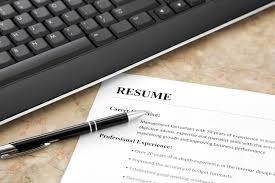03 July 2014

How to write a good resume
1. Be objective
Recruiters don't have all day to read huge texts or huge resumes, probably they're dealing with tons of resumes per day and eventually will have to quickly scan a resume to analyze the strong points of each candidate and to tell if he's worth or not, so first of all keep it simple, and mention only things that are really meaningful to a recruiter.
2. Keep it small
You're resume should have from 1 – 5 pages at maximum, and it should have mainly:
Header with name and contact
Phone and email, optionally a link to your personal website, not necessary to put any personal information like complete address or date of birth.
Objective and Introduction
A small summary of you and your skills and your main objectives on your professional career.
Education
This section should contain which university or places you studied and degree(s) you achieved: Technician, Bachelor, Masters or P.H.D, etc. List also your certifications if any, don't list any kind of 1 week course or seminaries, the only important ones are really long term courses.
Work experience
This section should list your work experience beginning with the most recent until your first work experience, list only those which are meaningful (your 1 month voluntary work experience in Hawaii wouldn't count too much here!)
Languages
List the languages you know but only those that you have an advanced level of understanding, you should be able to speak, read and write on a level that would be sufficient for you to perform well in a work environment that uses that language. If you know only the basics of a language or can't communicate effectively in it please don't try to trick the recruiter as it will look bad on you if you get to the point of having a personal interview and you demonstrate a lower level than what you actually put on your resume.
Technical Expertise
List a summary of your main technical expertises, it can be programming languages, databases, technologies that you feel you know the best, and put a sincere and real estimation of your level of knowledge on that topic, for example in Java from 1 to 10 (1 would be a very basic knowledge while 10 you would be at the level of James Gosling himself). To depict your level of knowledge you can use either a number scale or use words like, Basic, Advanced, Expert, some recruiters prefer years of experience, which for me it is nice to know but doesn't really tell the real level of expertise that a candidate has (as a candidate could have only been rarely touching a certain language or technology in a specific project, but puts in his resume as (s)he would have worked for 1 whole year with that).
Conclusion (optional)
Some candidates put a conclusion section putting any other interesting or curious facts about his(her) life, while this section is totally optional, there are some things that might add on top of your resume and can be worth mentioning, letting the recruiter know you are multi-skilled is not a bad thing, examples like: . Won a Silver medal on 2010 Vancouver Winter olympics on Alpine Skiing . Plays guitar as a hobby . Member of the municipal chamber of commerce or city council
Basically these are the main points a resume should have, only if you're aiming towards an academic position then you should have a more extensive resume listing all your academic publications and your science related work.
Also don't put too many fancy things like figures or photos, and use a clean and portable font type, don't waste your time trying to write or put too many things as that's not the point.
Remember the basic principles of a good resume: short, objective, clear, focusing on most important things and easily readable. Your chances are higher of catching a recruiters eye attention if you have a good resume, and finally one very important thing, never send a resume with grammar errors!